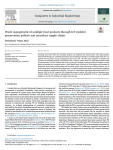Waqas Iqbal M. (2024). Waste management of multiple food products through IoT enabled preservation policies and secondary supply chains. Computers & Industrial Engineering, 01/11/2024, vol. 197, p. 110569.
https://doi.org/10.1016/j.cie.2024.110569
https://doi.org/10.1016/j.cie.2024.110569
| Titre : | Waste management of multiple food products through IoT enabled preservation policies and secondary supply chains (2024) |
| Auteurs : | M. Waqas Iqbal |
| Type de document : | Article |
| Dans : | Computers & Industrial Engineering (vol. 197, November 2024) |
| Article en page(s) : | p. 110569 |
| Langues : | Anglais |
| Langues du résumé : | Anglais |
| Catégories : |
Catégories principales 08 - ALIMENTATION ; 8.3 - Politique et Sécurité AlimentaireThésaurus IAMM DECHET ALIMENTAIRE ; GESTION DES DECHETS ; RECYCLAGE DES DECHETS ; CHAINE D'APPROVISIONNEMENT |
| Résumé : | Recycling food waste (FW) into secondary products can transform the waste-to-value. This study proposes reducing FW through IoT controlled preservation and consuming it through a secondary supply chain (SSC). It explores the best policies for SSC management that recycles FW. The food chain comprises of multiple food processors for preparing multiple food products, and a common retailer where IoT based preservation curtails food deterioration. The SSC consumes the FW by recycling into multiple secondary products at multiple recycling plants and retailing at a secondary retailer. A dual channel waste collection viz. from retailers and consumers is maintained. Each product within primary and secondary supply chains (PSSCs) has a different lifetime, rate of deterioration (RoD), and preservation effectiveness. A nonlinear mathematical model is presented that optimizes decision-making for maximizing profitability. Outcomes of computational experiments demonstrate that the SSC removes 100% of the FW, conserves 89% of material resources, reduces 16% of the total cost, minimizes preservation efforts by 50%, improves replenishment cycle, and increases profitability by 39%. Some managerial insights are provided for making vital supply chain decisions. |
| Cote : | Réservé lecteur CIHEAM |
| URL / DOI : | https://doi.org/10.1016/j.cie.2024.110569 |







